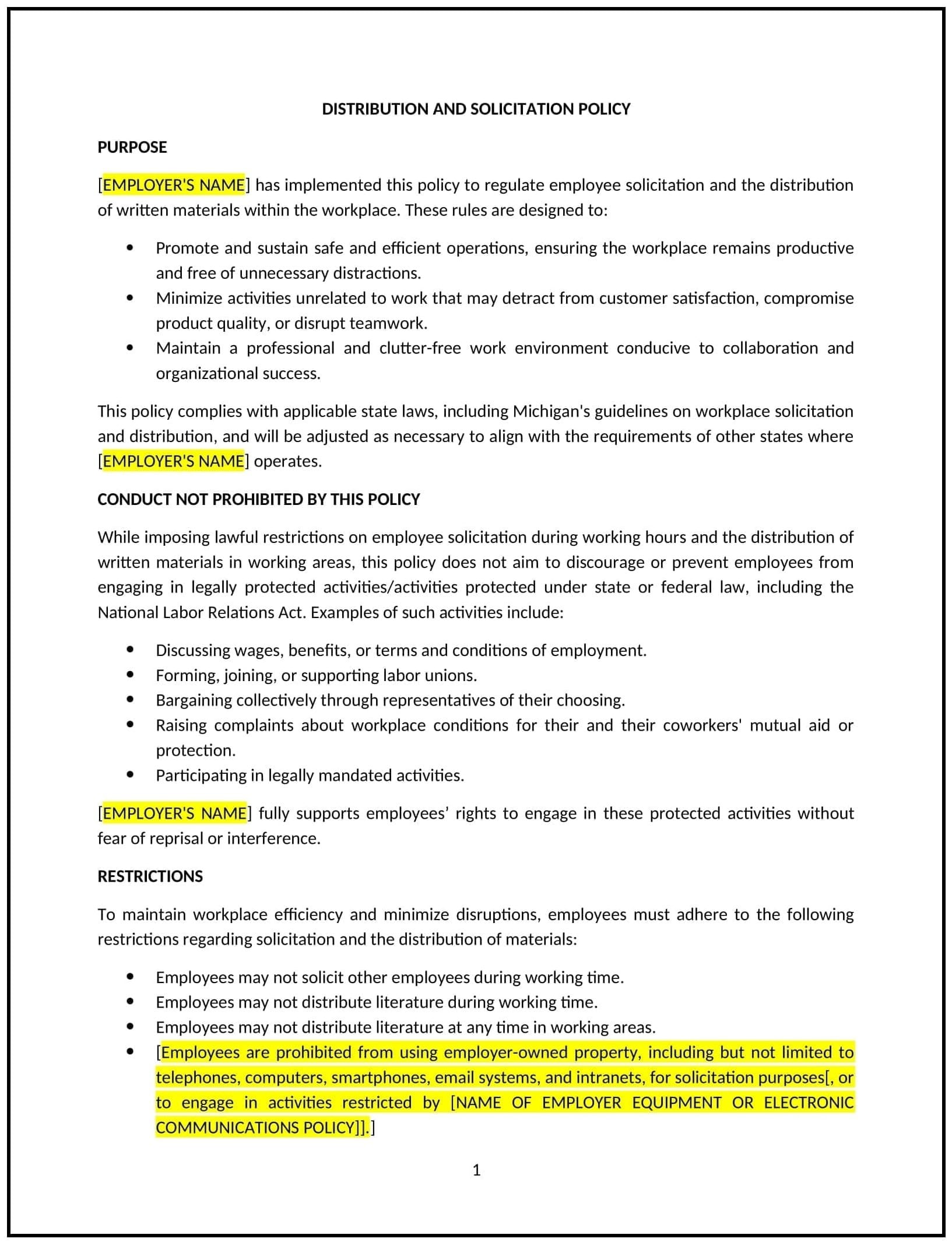Distribution and solicitation policy (Michigan): Free template
Got contracts to review? While you're here for policies, let Cobrief make contract review effortless—start your free review now.

Customize this template for free
Distribution and solicitation policy (Michigan)
A distribution and solicitation policy provides Michigan businesses with guidelines for managing solicitation and distribution activities on company premises. This policy ensures that all solicitations, including sales, donations, petitions, and other forms of outreach, are conducted in a way that respects the rights of employees and visitors while maintaining a productive work environment.
By adopting this policy, businesses can prevent disruptions, establish clear expectations for solicitors, and ensure compliance with applicable laws governing solicitation on company premises.
How to use this distribution and solicitation policy (Michigan)
- Define permissible solicitation activities: Clearly outline what types of solicitation are allowed on the business premises, such as charitable donations, sales of products, or petitions, and specify any restrictions on who can engage in these activities (e.g., employees only or approved external solicitors).
- Specify designated areas and times: Set guidelines for where and when solicitation can take place, such as designated areas for solicitation or specific hours during which solicitations can occur, to minimize disruption to work operations.
- Address non-solicitation zones: Identify areas where solicitation is not allowed, such as workstations, break rooms, or other spaces that may interfere with the workflow and productivity of employees.
- Outline approval processes: Establish a process for obtaining approval before conducting any solicitation or distribution activities, including how to request permission, what documentation is required, and who is responsible for granting approval.
- Promote transparency: Ensure that employees and visitors are informed about the policy and the rules governing solicitation through clear signage, employee handbooks, or internal communications.
- Address restrictions on types of solicitation: Specify any types of solicitation that are not permitted on company premises, such as political solicitation, disruptive behavior, or activities that could harm the company’s reputation.
- Specify consequences for violations: Clearly outline the consequences for violating the policy, including possible disciplinary actions, revocation of solicitation privileges, or removal from company premises.
Benefits of using this distribution and solicitation policy (Michigan)
This policy provides several key benefits for Michigan businesses:
- Maintains a productive work environment: By managing when and where solicitation can take place, businesses can minimize disruptions and ensure that employees remain focused on their work.
- Promotes fairness and transparency: Establishing clear guidelines for solicitation ensures that employees have equal access to participate in approved activities and helps avoid favoritism or confusion.
- Complies with legal requirements: By outlining acceptable solicitation activities, businesses ensure they are in compliance with local, state, and federal laws, including regulations related to free speech and employees' rights.
- Protects the business’s reputation: The policy helps prevent solicitations or distributions that could negatively impact the company’s image, such as politically charged campaigns or inappropriate sales tactics.
- Reduces conflicts: By clearly defining acceptable and unacceptable activities, businesses can reduce disputes and misunderstandings among employees or between employees and external solicitors.
Tips for using this distribution and solicitation policy (Michigan)
- Communicate the policy: Ensure that employees are aware of the policy by including it in the employee handbook and making it accessible through internal communications, signage, or a company intranet.
- Be consistent in enforcement: Apply the policy consistently across the organization, ensuring that all employees and visitors are treated equally and fairly under the rules for solicitation.
- Train employees on acceptable solicitation: Provide training to employees, particularly managers, on how to handle solicitation requests, how to identify acceptable versus prohibited activities, and how to apply the policy fairly.
- Monitor compliance: Regularly monitor and review solicitation activities to ensure they are compliant with the policy, making adjustments as necessary to maintain a balanced work environment.
- Review periodically: Update the policy regularly to reflect changes in Michigan laws, business operations, or any new practices or rules related to solicitation and distribution activities.